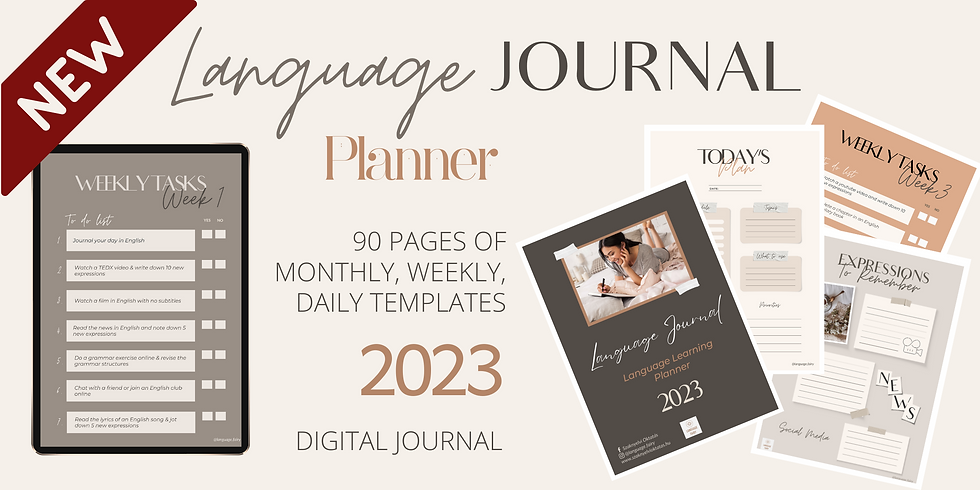Are you a quitter?
- Language Fairy

- Feb 19, 2023
- 3 min read
Are you one of those people who always give up on learning a new language?
Ok, then you are one of us! Welcome to the club!

Language learning is, without a doubt, a challenging and looooong process, so let me show you a great tool to help you stay motivated and keep on track!
One of the most effective methods is keeping a language journal or using a language learning tracker.
If you're serious about improving your language skills, using a language journal can be a game-changer. Not only does it help you stay organized and track your progress, but it also provides a space for reflection and self-assessment. By setting goals and reflecting on your progress, you can identify areas where you need to focus your study efforts, and adjust your learning plan accordingly.
How can a language journal help you?
Goal-setting and motivation: A language journal can help you set goals and track your progress. Writing down your monthly, weekly and daily goals can also help you clarify what you want to achieve and how to get there. If you break down your goals to smaller achievable steps, it can motivate and encourage you not to give up and continue with your language learning.
Organize your learning: If you plan specific skills and tasks for each day or week, it will help you organize your learning around certain topics or skills. Setting aside time for listening, writing or reading will allow you to focus on each step along the way and not to lose track. Use your journal to organize your study plan and set achievable goals for yourself!
Reflection and self-assessment: You can think about what you’ve already learned, what’s been challenging, and what strategies have worked best for you. This reflection can help you identify areas you need to work on, modify your strategies, decide on which skills you need to ask for help. The journal will give you a better understanding of your strengths and weaknesses.
What pages should you create in your language journal?
Yearly/monthly/weekly/daily goal setting + tracking pages
Vocabulary pages for different topics
Platform related pages (socials, youtube, podcasts etc.)
Weekly and daily skill-related specific goals
Writing pages
Travel-related pages
How can you make the most of your language journal?
Be consistent: The key to success with a language journal or tracker is consistency. Make sure to write in your journal or track your progress every day, even if it's just for a few minutes.
Make it personal: Your journal or tracker should be personal to you, so make sure to include things that are important to you, such as your goals, interests, and challenges.
Be creative: Don't be afraid to be creative with your journal or tracker. You can include drawings, photos, or other visuals to help you remember new vocabulary or grammar points.
Make it fun: Make your language journal or tracker a fun and enjoyable experience. You can include jokes, riddles, or fun facts about the culture and language you're learning.
Use it as a resource: Finally, make sure to use your journal or tracker as a resource. You can go back and review what you've learned and use it to study for exams or to prepare for conversations.

So why not give it a try?
Download my Language Journal HERE and start by setting aside a few minutes each day to jot down new expressions, set new goals, journal your thoughts and start to progress! You'll be amazed at how much your language skills can improve!




Comments